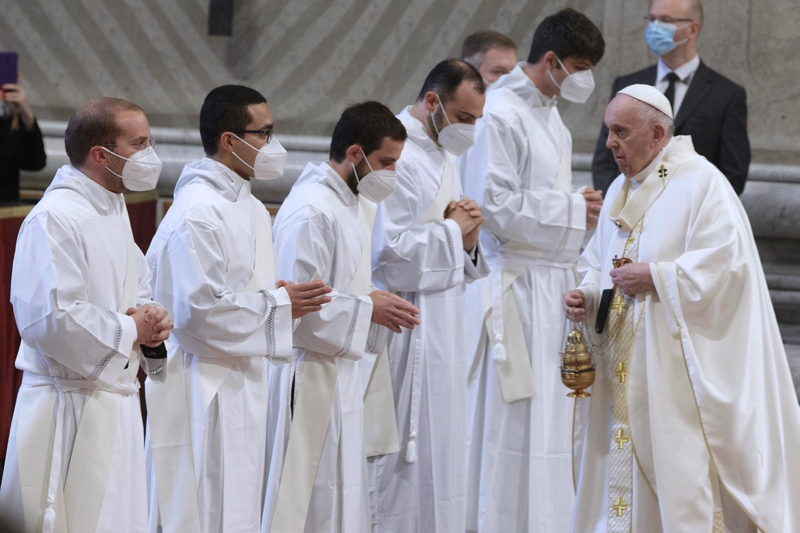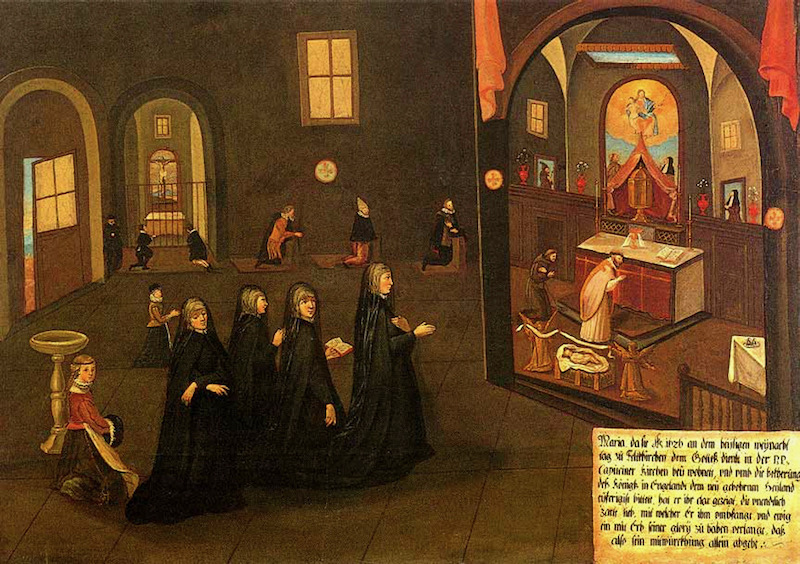‘Women in time to come will do much’, said Mary Ward back in the seventeenth century, and we are still striving to put those words into action; but we can’t do everything on our own, and we can’t do it with our hands tied behind our backs, with others pretending we aren’t there.
Some of the bitterness evinced over the marches to demand safe streets for women arose because it is not only women who should be calling for this. Just as childcare is not a ‘women’s issue’ but a ‘parents’ issue’, safe streets are something from which we would all benefit. The distinction here should not be between men and women, but between acceptable behaviour and unacceptable behaviour. When men object to other men’s behaviour, we might make some progress. It would be something new and difficult for them, since so much of young men’s identity seems to be almost tribal (football, groups in pubs, gamers), and based on keeping someone else out of the group (nerds, different races, but above all women). With equal numbers of sons and daughters, I would like both groups to be fairly treated. We don’t want to demonise men; we don’t want to victimise women. We work best when we work together.
All great enterprises have needed the input of women as well as men. Their contribution has often been overlooked. One of the exciting developments of the last few years has been the willingness to seek out and make better known some of these women, from artists like Artemisia Gentileschi, to mathematicians like Ada Lovelace, to scientists and computer wizards like the three women at NASA in the film Hidden Figures, working on the first space flights.
Women tended in the past to miss out on the publicity and the prizes (Rosalind Franklin and the structure of DNA?). Maybe we aren’t as good at blowing our own trumpet. Regularly nowadays I read obituaries about some amazing women whose achievements have been forgotten, often because they were so modest or chose to focus on other things. Sometimes the habit of official discretion has become instinctive, and we learn of great deeds at Bletchley Park or as part of SOE or similar, only once someone has died. Luckily we are now moving beyond the pioneering women phase, and it is entirely normal to see women among the background forces working on space landings, epidemiological research and a whole range of other disciplines, and even occasionally fronting a press conference or two. It does not surprise us, and that is good, because if you investigate historical achievements, you don’t have to dig very far before finding that of course women were involved too, and not just as the people doing the cooking, cleaning and nurturing without which the human race would have died out long ago. The problem was that they were invisible.
Even in the early Church, there were a lot of women, but you have to read the text carefully, almost between the lines, to find them. St Paul refers by name to many of them, when he sends greetings. There were ‘many’ women accompanying Jesus, even if the (male) narrators of the Gospels tend not to give us names (though there are several Marys, like the Queen of Scots’ attendants). ‘Many women were there by the cross, watching from a distance, the same women who had followed Jesus and looked after him’ (Mtt 27.55). Jesus had several women among his followers, enough of them to support and protect each other in a society even more gender-restricted than our own, but the (male) Gospel writers, decades down the line after the Lord’s departure, list and label only their own mates. If only we had a Gospel written by one of Jesus’ female friends. The problem again is not that the women aren’t there, the problem is visibility. Without visibility, there is no recognition. It is very hard to make a difference if even your existence is not admitted. I’m not talking about the recognition of praise for achievement, compensation for effort or anything like that; I’m talking about the awareness that women belong in and contribute to every organisation – including the Church.
While Jesus is there on earth, he makes space for them. Mary of Bethany is allowed to sit at his feet with the men, and Mary Magdalene is sent as the first messenger to tell of the Resurrection (but the men don’t believe her testimony until much later). Once Jesus is gone, the rot sets in at an early stage, when the apostles decide to make up the numbers after the loss of Judas and then later (Acts 6), when they need more people to help with charitable distribution. Not realising that the word ‘men’ equally meant ‘men and women’ in those historical days, they unfortunately picked only men, and the hierarchy of the Church dug itself deeper and deeper into a single-sex groove.
Occasionally we see glimpses of a different approach, as with double monasteries, one half for men, one half for women, occasionally even directed by a female Abbess, both in Britain and on the Continent (e.g. Hilda of Whitby, Bridget of Sweden). But then the authorities decided that holy women needed to be kept apart and under male control, so only enclosed orders were allowed for women, though monks could choose whether to be enclosed or roving preachers and missionaries, and the double monasteries were no longer allowed. Female convents still had to let men in, because of the priestly monopoly. Men were in a position to prevent any female access at all, as they still do on Mount Athos.
Why are men so frightened of women? Women tend to be smaller, less strong, less rich, less violent, less noisy. The fear has to be learned behaviour, because little boys are not naturally scared of little girls, nor are they more violent, unless you allow them to think that it’s acceptable behaviour (I’m extrapolating from my own family here). Once they go to school, it’s harder to prevent violence, because small humans will always copy what they see, and some primary school children have sadly already witnessed violence at home. We need to be much more concerned to prevent physical violence at school; and as soon as a gender element appears, we need to make it clear immediately that it is unacceptable. No girl, from nursery school up to sixth form, should ever be encouraged to make allowances or expected to put up with any degree of physical violence. We know where it leads. As Margaret Attwood memorably wrote, ‘Men are afraid that women will laugh at them. Women are afraid that men will kill them’, and the facts bear her out.
The education of boys is crucial. For years we have been teaching girls to be scared, to be careful, to worry before any event about how they are going to get home. School – for girls – reinforces conversation from home. My girls discuss this sort of thing a lot, with varying degrees of irritation; my boys hear these conversations, and occasionally join in. But the boys were never offered any advice at school about not being intimidating, about not following too closely, about being aware of the feelings of a woman out at night; about the whole central question of consent and freedom. Not everybody has sisters. But imagine the impact if a male teacher talked to a class of young men about wolf-whistling and cat-calling, let alone about conversations ranking girls and ‘tottymeters’, a word I had mercifully not come across until Boris Johnson used it.
The reason why inclusive language is important is that it contributes to women’s visibility, and visibility is the most basic requirement for justice. We tell women to keep to lighted streets; if you can be seen, you will be more safe. Not being seen, being kept in the dark, trying to keep out of sight: all these make you more vulnerable. Visibility is not just about street lighting; it is also making sure that women are included in the discussion.
Many years ago, I worked at the GLC. People poked (usually gentle) fun at the Women’s Committee and the Ethnic Minorities Committee. Every report on a project, or with a proposal, had to have a paragraph on the implications for women, and the implications for ethnic minorities, even if in effect only to say that there were no such implications. I was slightly uncomfortable about this in those days. A whole report and women’s implications rated one measly paragraph? But it made everyone notice that women existed, indeed, made up half the population, and maybe would be impacted differently. All this was valuable, and very much better than deliberately choosing words which refer only to men, because women don’t matter.
Many parishes have Justice and Peace groups, but for these to exist in good faith, the Church needs to be on the right side of this argument. The Church cannot claim the moral high ground if there is no understanding that women are people just as much as men. Dorothy Sayers wrote a fascinating polemic, ‘Are Women Human?’, and the question is sadly still live today. The Government has a similar problem of credibility over human rights; if women don’t have human rights in a country, no one has. Exclusively men’s rights are not ‘human rights’. Justice only for men is not justice. For centuries the Church has been part of the problem, a solid example of what it should be campaigning against. It needs to be part of the solution, especially in countries with a long Catholic history. It needs to tell the men to accept women as equals; but it can’t be convincing unless it stops pretending that they don’t exist, that they should never be mentioned aloud.
The Church has been on the wrong side of this argument for a very long time, just as it was over Galileo, slavery and anti-semitism, but it has managed to alter its position on all three, even if it took unconscionably long to do so. Women have been around since the Garden of Eden. We should be able to address a congregation as ‘brothers and sisters’ without worrying; psalms don’t need to refer only to ‘the just man’. We all deserve better than this. Women are not to be swept under the carpet, or hidden away in the small print; they are the essential complementary half of the likeness of God.
Kate Keefe composes musical settings for the Mass and writes about the psalms. You can follow her on Facebook, Twitter and LinkedIn



 Loading ...
Loading ...
What do you think?
You can post as a subscriber user ...
User comments (0)